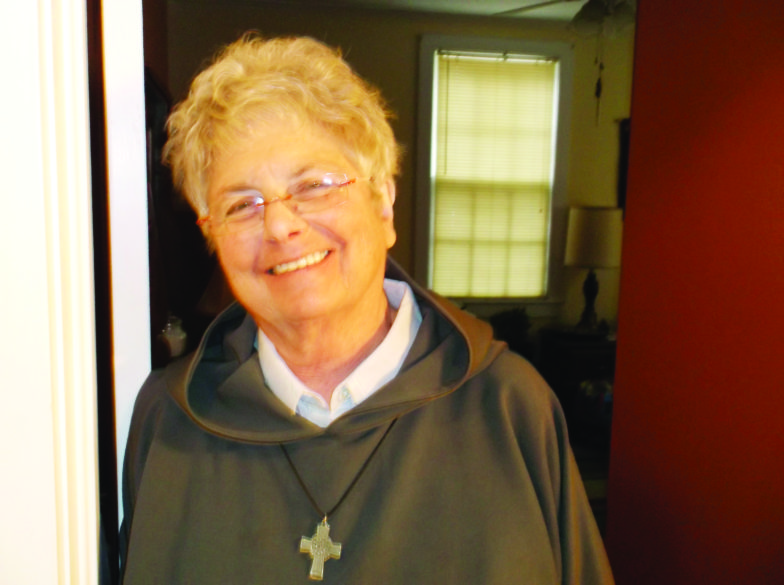
From the hermitage
By sister alies
Advent prepares us and heightens our longing. Our longing finds its place alongside our ancestors and God’s expressions of longing in the Hebrew Bible. Consider what our Catechism says: “The coming of God’s Son to earth is an event of such immensity that God willed to prepare for it over centuries. God makes everything converge on Christ: all the rituals and sacrifices, figures and symbols of the ‘First Covenant.’ God announces Christ through the mouths of prophets who succeeded one another in Israel. Moreover, God awakens in the hearts of pagans a dim expectation of this coming.” (522) Further, “When the Church celebrates the liturgy of Advent each year, she makes present the ancient expectancy of the Messiah, for by sharing in the long preparation for the Savior’s first coming, the faithful renew their ardent desire for Jesus’ second coming. By celebrating John the Baptist’s birth and martyrdom, the Church unites herself to his desire: ‘Jesus must increase, but I must decrease.’” (524)
Depending on how I live and celebrate Advent, I am at least either a pagan with a ‘dim expectation’ or part of the faithful with an ‘ardent desire’ to fully meet Jesus. I should like to be the latter, but alas I find within myself blocks and winding paths that seem to veer right away from an ardent desire. Lazy? Fearful? Hopeless? Whatever the blocks in me might be, or in you, they will eventually be removed by Jesus. I suspect that’s the point of Advent so that when we do come to reflect more deeply upon the story of Christmas our hearts might be ready to entertain some of its cost.
I was reflecting that Christmas is both joy and conflict when I came across a book I’d read some years ago, The First Christmas, What The Gospels Really Teach About Jesus’ Birth, by Marcus Borg and John Dominic Crossan. It made me continue to consider longing and conflict. Simply put, Jesus was a refugee Child forced from His country of birth, crossing the borders into a foreign land, Egypt. Other children were being killed and it would be some two years before the Christ Child returned home with Mary and Joseph to Nazareth.
This past year we have been plagued for many and various reasons with raids, separation of children from parents, immigrants and refugees being expelled, deported or jailed. In both cases we see the conflict and battle of speaking truth to power. There is nothing wrong with a just immigration policy. But for thousands of tiny children scared and made mute by the trauma we have to wonder how Jesus and His parents faired in Egypt.
Christmas, its story, facts and symbols, points to the conflict within and the conflict to come. Most of us have a pretty complete understanding of the Christmas story so our reflection upon it might be too swift. Let’s consider some of Matthew’s story you might have skipped over. Borg and Crossan share: “Mathew’s story sounds the theme of fulfillment but its emotional tone is ominous. Driven and dominated by Herod’s plot to kill Jesus, it is dark and foreboding. It speaks of the murderous resistance of the rulers of this world to the coming of the kingdom of God.”
I like the Catechism’s explanation of the ‘Christmas Mystery:’ “Jesus was born in a humble stable, into a poor family. Simple shepherds were the first witnesses to this event. In this poverty heaven’s glory was made manifest. The Church never tires of singing the glory of the night: The Virgin today brings into the world the Eternal and the earth offers a cave to the Inaccessible. The angels and shepherds praise Him and the magi advance with the star, for You are born for us, Little Child, God Eternal. To become a child in relation to God is the condition for entering the kingdom. For this we humble ourselves and become little … Christmas is the mystery of marvelous exchange.”
Equally the text in the Catechism tells us of the conflict midst the beauty: “the flight into Egypt and the massacre of the innocents make manifest the opposition of darkness to the light: ‘He came to His own home, and His people received Him not. (John 1:11) Christ’s whole life was lived under the sign of persecution. His own share it with Him. Jesus’ departure from Egypt recalls the Exodus and presents Him as the definitive liberator of God’s people.”
Venture deeper into Advent and begin the Christmas season, alert to both the joy and conflict and see how it plays out in our world and in our own hearts.
Blessings.
(Sister alies therese is a vowed Catholic solitary who lives an eremitical life. Her days are formed around prayer, art and writing. She is author of six books of spiritual fiction and is a weekly columnist. She lives and writes in Mississippi.)
